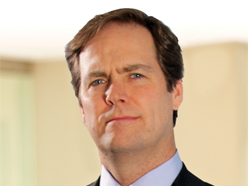
Few people know the best-kept secret of John Wilson, senior portfolio manager at Sprott Asset Management.
He shares a fortuitous connection with Hollywood actor Mark Wahlberg, Grammy-award-winning singer Patti Austin, and producer Seth MacFarlane.
They’re all alive because an unexpected change of plan prevented them from boarding flights becoming victims of the 9/11 attacks on the World Trade Centre.
Wilson, whose flight from Toronto to New York was cancelled due to a hurricane, was meant to be at the Marriott Hotel inside the WTC that fateful day.
That he betrays no emotion while recounting this life-altering experience shows composure comes naturally to him. And so it should for a portfolio manager responsible for manoeuvring three funds worth a total of $103 million through the current market turbulence.
Global outlook
Wilson’s global view on equities remains positive despite market reality.
“I’m uncomfortably bullish on the equity market,” he says. “Issues like the U.S. fiscal cliff and the European debt crisis keep coming at us — and yet the S&P 500 has more than doubled over the last three-and-a-half years.”
Read: Patient capital
These issues, he says, are so large they’re going to last perhaps a decade before being addressed.
But a bigger is going largely unnoticed, he says.
“Japan has lurked off to the side, but the situation has really been deteriorating over that last six to 12 months,” he says. “The tsunami that hit their economy [last year] and, more recently, the diplomatic row with China have been hurting Japan’s economic outlook.”
Additionally, the nation has been grappling with aging demographics, near-negative savings rates, and a 220% debt-to-GDP ratio — by far the largest government debt in the world.
“That’s a real witch’s brew,” says Wilson.
Asset allocation
The noise around Iran, Arab Spring and other geo-political events has drowned out real news.
“More concerning are the risks that are more systemic in nature,” he says. “Events like Lehman Brothers in 2008 can cause a sharp contraction in the global financial system, which could be prolonged and painful.”
A passionate hiker, Wilson meets challenges with patience and planning. His investment philosophy is the best evidence of that.
“Our strategy as to what to own in the current zero-interest-rate environment [includes] assets that have the potential to go up in value,” he says. “We think central banks around the world are going to inflate asset prices. Certainly equities qualify there.”
Within equities, Wilson likes companies with strong balance sheet that devote their free cash flow to dividends or share buyback.
Read: Profit and promises
His portfolio has companies such as Domtar (a paper company), Viacom (a media company) and Cisco (a tech company), which buy back 10% to 15% of their stocks.
Lumber is also an option. “[There’s] still a lot of leverage in that industry as lumber prices continue to move higher.”
In the auto sector, GM and Magna “can provide decent growth” and “their stocks remain cheap.”
Wilson adds the technology sector has “benefitted from how businesses are looking at investing in technology.”
But he’s not a fan of Apple. Why? “Phones continue to be a big chunk of their revenue market and they’ve stabilized in terms of market share,” he says. “[Apple] continues to see pressure from Android and Samsung and other competitors.”
Risk controls
One of the biggest risks investors face today is what he calls “Monday morning risk.”
“You turn on your computer and TV and everyone’s screaming; futures are down 800 points; another Lehman-like failure; or a dramatic change in Europe’s situation,” he says. “[They] come at you over the course of the weekend and don’t allow you to adjust for it beforehand.”
To mitigate this danger, Wilson recommends having risk controls that can adapt on the fly.
“Number one, we use put options on the very liquid U.S. indices [in case of a sudden downturn],” he says. “[Put options] operate as insurance for the big drawdown scenarios [because] they pay off in a large amount and can actually mitigate, if not eliminate, most of your losses.”
The second tactic: cut losers early and let your winners run. Investing, he says, is a game of forecasting, which is inherently inaccurate.
“We spend a lot of time identifying the least optimal things we own within our portfolio and finding something better to swap them out,” he says. “We run a loss limit on every name we own. We won’t lose more than a certain amount [and if need be] exit immediately.”
The biggest danger no one’s talking about is the central banks and their accommodative monetary policies. This will inevitably lead to asset inflation, says Wilson.
“In the last three years while we’ve been printing money, corn is up five-fold; food is up twice; gasoline is three times [higher]. So we’re generating this type of inflation in asset prices that factors into people’s real cost of living,” he says. “The danger is way too many people are going to have their real purchasing power destroyed; it’s already happening.”
Going all cash
“We move our cash balance pretty actively and, theoretically, if we had to, we can go 100% cash,” says Wilson. “Typically, we’re between zero and 40% cash because we have the puts. So if things are getting risky I can cut my equity exposure down to a level that is cost-effective to protect with put insurance.”
The only time he went all cash was in October 2008. “We were at a point where we felt the stock exchange was going to close,” he says. “I’d rather be in cash than be invested in a bunch of assets that I don’t have access to.”
But he senses no likelihood of that happening in the near future.